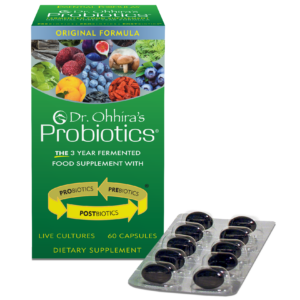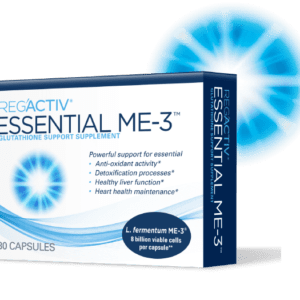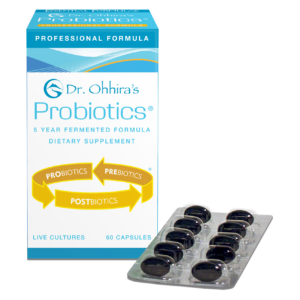The probiotic industry has developed and uses colony forming units (CFUs) to indicate the number of live bacteria in a probiotic supplement. Many people mistakenly think that more CFUs mean a better product. The National Institutes of Health says, “…higher CFU counts do not necessarily improve the product’s health effects.”
Manufacturers typically state CFU counts at the time of manufacture. Look for products that display the CFUs at the end of their shelf life, not the count as they leave the manufacturer’s facility. CFUs typically degrade between when the product is shipped and when you purchase or consume it, reducing its viable CFUs.
Also, be aware that CFU counts can often be misleading. In a study of 19 probiotics, five had lower CFUs than the label listed, and some had bacteria the label didn’t list. Quality is paramount when selecting a probiotic supplement.
Let’s start with a few basics about probiotics.
What Are Probiotics?
According to the World Health Organization, probiotics are “…live microorganisms that, when administered in adequate amounts, confer a health benefit on the host.” Probiotics usually work in the gastrointestinal tract, influencing intestinal microbiota.
The most common live microorganisms found in probiotic supplements come from bacteria classified as Lactobacillus, Bifidobacterium, Saccharomyces, Streptococcus, Enterococcus, Escherichia, and Bacillus. In each of these broad groups, unique strains provide different benefits, including healthier digestion, elimination, immune function, and cellular growth.
There is currently a tremendous amount of research on probiotics and their effect on the body. Out of more than 1,000 registered clinical trials, 713 addressed the gut. Lactobacillus rhamnosus GG (LGG) was the most frequently registered, and Bifidobacterium animalis ssp lactis BB12 was second.
Understanding two other elements of the probiotics equation that figure into their effectiveness is essential.
What Are Prebiotics?
Prebiotics are a food supply for the microorganisms in your gut. They typically come from your food, but some supplements, such as Dr. Ohhira’s, contain them. Prebiotic foods have a component called fermentable soluble fiber. The most common sources of prebiotics in your diet are resistant starches. These starches are available in many common foods:
- Green bananas
- Oats
- Barley
- Rice
- Legumes
- Beans
- Boiled and chilled potatoes
Foods that contain inulin are prebiotics:
- Soybeans
- Wild yams
- Onions
- Garlic
- Asparagus
- Leeks
- Dandelion greens
Foods that contain pectin also act as prebiotics:
- Peaches
- Green beans
- Raspberries
- Tomatoes
- Apples
What Are Postbiotics?
When you consume probiotics and prebiotics, the actions of the bacteria metabolizing the prebiotics create helpful substances. Among them are vitamins, short-chain fatty acids, enzymes, amino acids, and antimicrobial peptides that help manage harmful bacteria. These postbiotics are primarily responsible for the positive actions of probiotics in our bodies.
What are CFUs in Probiotics?
Once you start researching the health benefits of probiotic supplements, you’ll soon encounter the term CFUs. This figure is the manufacturer’s estimate of the number of live microorganisms in the probiotic formula. Scientists consider many bacteria growing together to be a colony.
How Do Manufacturers Measure CFUs?
Measurement occurs in a laboratory, typically on the manufacturer’s premises, but many manufacturers use an independent laboratory to verify CFUs.
How Many CFUs Should a Good Probiotic Have?
More is better when it comes to CFUs, right? Occasionally, we hear, “My probiotic has 20 billion CFUs per dose, but the other brand only has about 400 million CFUs per dose,” implying that the probiotic must be better because it contains a much larger number of bacteria per dose.
Customers always ask us about probiotic dosage. Some probiotics have an ultra-high CFU count per dose. However, the National Institutes of Health Office of Dietary Supplements says a high CFU count doesn’t necessarily boost the health benefits. The body can only absorb so much.
What is more critical in determining “a Good Probiotic” is the presence of multiple strains of bacteria, how the manufacturer creates them, how well they survive in the body, and the quality of the product.
What Is a Quality Probiotic?
There are many options for probiotic supplements on the market, and choosing the best one for you can be confusing. What should you look for?
Natural Ingredients
Because of the natural fermentation process, a quality probiotic such as Dr. Ohhira’s naturally contains all three probiotic elements. Dr. Ohhira’s probiotic supplements contain 12 probiotic strains. We culture them for three years in a prebiotic medium containing wholesome fruits, wild vegetables, goji berries, mushrooms, seaweed, and other pure, natural ingredients.
Three-Year Fermentation
Coexistence for three years promotes “cooperation” between the strains, provides healthy nourishment, helps the strongest bacteria survive, and results in a final product that contains postbiotics that the strains have created during culturing. The result is a probiotic supplement equipped to nourish existing bacteria and quickly develop colonies in the intestines. These unique attributes make it a highly effective probiotic supplement.
Multiple strains
As of yet, researchers haven’t been able to locate particular probiotic strains that impact specific conditions in the body with enough certainty to determine whether one strain is most effective for the health of a particular body system. However, much research is happening in this area, with many studies finding that a supplement with multiple strains has the most positive effects.
Dr. Ohhira’s probiotic supplements contain twelve probiotic strains that support digestive comfort, nutrient absorption, and a healthy immune system.
Purity
Make sure there are no unwanted elements in your probiotic. Look for ingredients you recognize on the label, including in the “Other Ingredients” section. If there are multiple elements that you can’t identify, there could be ingredients you’d prefer not to put in your body.
A probiotic supplement should be hypoallergenic. For instance, someone allergic to gluten or dairy could have unwanted side effects from taking a probiotic containing those items. It should be non-GMO and vegetarian and be free of soil-based organisms, chemicals, preservatives, coloring, flavoring, and pesticides.
-
 Dr. Ohhira’s® Probiotic Supplements with Original Formula$13.95 – $89.95
Dr. Ohhira’s® Probiotic Supplements with Original Formula$13.95 – $89.95 -
 Reg´Activ® Essential ME-3$39.95
Reg´Activ® Essential ME-3$39.95 -
 Dr. Ohhira’s® Probiotics Professional Formula$39.95 – $129.65
Dr. Ohhira’s® Probiotics Professional Formula$39.95 – $129.65
FAQs
What Are CFUs in Probiotics?
“Colony-forming units” is the term the probiotics industry uses to describe how many live organisms a probiotic supplement contains.
How Many CFUs Should a Good Probiotic Have?
The current focus on the number of CFUs in a probiotic has created confusion among consumers. Bacteria can double their numbers in 30 minutes in the right environment, therefore the quantity of CFUs is not a meaningful gauge of a probiotic supplement’s value or effectiveness. The purity of the product, the types of bacteria in the supplement, the survival rate of the bacteria, and whether they contain pre- and postbiotics are critical considerations.
Final Thoughts About Probiotics and CFUs
Probiotics are receiving a great deal of attention in medical and research arenas for good reason. Indications are that they confer a host of health benefits for the human body. When looking for a probiotic, remember that quality, natural ingredients, purity, multiple strains, and the presence of prebiotics and postbiotics are critical components for an effective probiotic.
At Dr. Ohhira’s, we carefully craft pure and effective probiotic supplements using the most modern research combined with ancient Japanese wisdom. This combination results in a quality product you can trust.
If you have any questions, please get in touch with us online or reach out by phone at 972-255-3918.
- https://essentialformulas.com/contact/
- https://www.webmd.com/digestive-disorders/pick-right-probiotic
- https://isappscience.org/for-consumers/learn/probiotics/
- https://ods.od.nih.gov/factsheets/Probiotics-HealthProfessional/#h16
- https://www.sciencedirect.com/science/article/pii/S2405844020313116
- https://health.clevelandclinic.org/what-are-prebiotics
- https://essentialformulas.com/dr-ohhira-difference/
- https://www.healthline.com/nutrition/postbiotics#what-they-are
- https://pubmed.ncbi.nlm.nih.gov/21229254
- https://essentialformulas.com/
- https://essentialformulas.com/contact/






